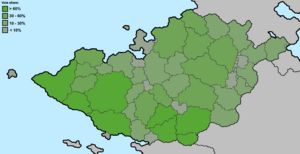Hytek Rural Party: Difference between revisions
(Created page with "{{WIP}} {{Infobox political party | name = Hytek Rural Party<br><small>Hitekietis Lauku Partija</small> | logo = HLP Logo.png | colorcode = #58A835 | leader = Edsuz Auza | dep...") |
No edit summary |
||
| Line 42: | Line 42: | ||
== History == | == History == | ||
=== Background === | === Background === | ||
[[File:HLP Foundation.jpeg|300px|thumb|right|Silina and Höller at a HLP gathering in August 2001]] | |||
The Hytek Rural Party was founded initially by two people: Hytek Serena Silina and Tudonian Hytek Georg Höller on June 14, 2001, in Krasno. Following the increase in political rights and newfound rights to free speak and party representation in the national government, the first HLP's "campaign for the countryside" gained them popularity amongst the rural populace in the west, who suffered neglect under communist rule as the brunt of economic investment in the country (of which there was already little) was directed towards the Pekrasta-Krasno urban conglomerate in the east. Those who worked rural jobs, particularly farmers, felt they were misrepresented by the communist regime and were largely silenced in their opposition to continual urban funding. | |||
Throughout mid-2001, the HLP campaigned against the highest rural poverty rates than in the city, unusual for a nation of Hytekia's position and stature, and social degradation in the rural areas, particularly in smaller cities of over 100,000 in the countryside, where crime rates had been rapidly increasing for over two decades. These two main talking points allowed the HLP to not only regionally connect with the rural populace, but nationally connect with rural people everywhere, as well as urban dwellers who stood in solidarity with the neglected rural populace. By the time elections in November 2001 had rolled around, the party had grown to an estimated 7,000 official members. | |||
=== Early campaigns (2001-2006) === | === Early campaigns (2001-2006) === | ||
[[File:HLP Election map 2001.png|300px|right|thumb|The HLP's vote share in the 2001 election]] | |||
=== Modern governments and history (2006-) === | === Modern governments and history (2006-) === | ||
Latest revision as of 09:02, 2 September 2019
This article is incomplete because it is pending further input from participants, or it is a work-in-progress by one author. Please comment on this article's talk page to share your input, comments and questions. Note: To contribute to this article, you may need to seek help from the author(s) of this page. |
Hytek Rural Party Hitekietis Lauku Partija | |
|---|---|
 | |
| Leader | Edsuz Auza |
| Founded | June 14, 2001 |
| Headquarters | Bijušais iela 2, Krasno |
| Youth wing | Rural Youth |
| LGBT wing | RuraLGBT |
| Membership (2019) | 317,000 |
| Ideology | Hytek nationalism Economic liberalism Agrarianism Social conservatism Right-wing populism |
| Political position | Right-wing |
| International affiliation | None |
| Colours | Green |
| Grand Council | 24 / 57
|
| Palata | 196 / 417
|
The Hytek Rural Party (Hytek: Hitekietis Lauku Partija, Alemannic: Hitekisch Ländliche Partei, both abbreviated to HLP) is a socially conservative, nationalist and right-wing populist political party in Hytekia. With 24 members in the Grand Council as well as 196 members in the Palata, the party is the largest in the country, although it usually requires a coalition government in the Palāta. As of 2016, this coalition consists of the Unity Party, Melnadure and the Hytek Liberal Party, all four of which make up 238 of the 417 seats. The current leader of the party is Edsuz Auza, who is also serving as the President of Hytekia for his second successive term.
The HLP was formed in 2001 following the removal of Alemannic forces from Hytekia after the 1998 occupation and the formal beginning of free democratic elections in the country. The party was formed mainly to represent Hytekia's large rural population that had been underrepresented under the regime of the Communist Party, who mainly targeted industrialised, urban areas for their votes. The HLP saw initial success in the 2001 election, winning 5 and 59 seats in the Grand Council and Palata respectively, but formed the opposition in both to the Red Rose/Labour coalition that emerged from the election. Their vote share led to increased membership, donations, funding and media attention, which ultimately led to them winning the 2006 elections, gaining 127 seats in the Palata and 10 in the Grand Council and becoming the largest party in the country. The 2006 elections were the birth of the so-called "coalition of four" - the Rural Party, Unity Party, Melnadure and the Liberal Party.
In recent times, the HLP has drifted to a more right-wing stance, with anti-immigration and isolationist policies slowing becoming more mainstream within the party. In the most recent election in 2016, the party won 196 of the seats in the Palata, their highest so far, with 36.6% of the vote share.
History
Background
The Hytek Rural Party was founded initially by two people: Hytek Serena Silina and Tudonian Hytek Georg Höller on June 14, 2001, in Krasno. Following the increase in political rights and newfound rights to free speak and party representation in the national government, the first HLP's "campaign for the countryside" gained them popularity amongst the rural populace in the west, who suffered neglect under communist rule as the brunt of economic investment in the country (of which there was already little) was directed towards the Pekrasta-Krasno urban conglomerate in the east. Those who worked rural jobs, particularly farmers, felt they were misrepresented by the communist regime and were largely silenced in their opposition to continual urban funding.
Throughout mid-2001, the HLP campaigned against the highest rural poverty rates than in the city, unusual for a nation of Hytekia's position and stature, and social degradation in the rural areas, particularly in smaller cities of over 100,000 in the countryside, where crime rates had been rapidly increasing for over two decades. These two main talking points allowed the HLP to not only regionally connect with the rural populace, but nationally connect with rural people everywhere, as well as urban dwellers who stood in solidarity with the neglected rural populace. By the time elections in November 2001 had rolled around, the party had grown to an estimated 7,000 official members.

